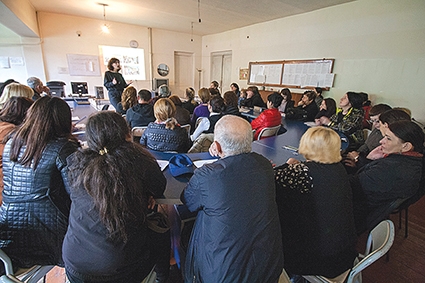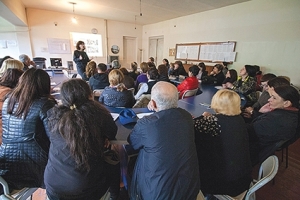Peace Meet: Mestia, Svaneti
We were summoned, all Svaneti regional English teachers and our school directors, to a midweek meeting at School No. 1 in Mestia, organized by the “Peaceful Corpus” as the Georgian description went, whatever that was. It was some time before I realized that it actually meant the Peace Corps, America’s great program of service in over 60 countries around the world.
The organization has been in existence since President John F. Kennedy initiated it in 1961, expressly “To promote world peace and friendship through a Peace Corps, which shall make available to interested countries and areas men and women of the United States qualified for service abroad and willing to serve, under conditions of hardship if necessary, to help the peoples of such countries and areas in meeting their needs for trained manpower.”
Georgia’s statistics include a start in 2001, with over 735 volunteers having served since then and about 110 being current, on the standard 2-year program after 3 months of through training. An extension may be granted upon request. The main features here are English teaching of at least 18 hours per week, in concert with a co-teacher, and other community development projects too. The American volunteers (all must be such) stay in carefully chosen and vetted host families, pay them a stipend, and receive a small salary. Much like TLG (Teach and Learn with Georgia), the organization I’m in; indeed, ours was permitted to borrow much from PC training and infrastructural materials in its inception.
I once met a couple of young ladies who had been Peace Corps volunteers in Svaneti, but this was some years ago and I’ve not been aware of any since, though they may have come and gone. But, as I seem to have been the sole TLG volunteer in all Svaneti for a few years now, there is plenty of room for PC to fill the huge available gaps remaining all over the region, in both schools and communities.
The presenters gave a detailed overview of how Peace Corps works, the application process for potential volunteers, host families and communities; and let us know that this process would re-start for Svaneti this September, meaning inflows of successful applicants a year after that, so, September 2018 or so. There were a number of quite pertinent questions, about why neither school directors nor English co-teachers could host (conflict of interest) and about “orientation” (referring coyly to gender issues; vetting and training of all parties would be thorough, we were assured, although Peace Corps is thoroughly equal-opportunity…). They asked us to consider at least three good possible host families for each potential host community, none of whose homes shall be more than 45 minutes’ walk from the host school as a rule. Information packets circulated and were also promised online; a few more questions and words of thanks; then it was over and we were dismissed to greet one another and disperse.
I was delighted to be introduced afterwards to the current English teacher in Ushguli, of which there have been an unbroken stream for several years now, as per my long season of urgent requests to the Georgian Ministry of Science and Education not to let my own hard work there go to waste. From the sound of things, the level of English in the village is indeed still climbing, as it must for this hugely popular destination, end of the road in the country and supposedly highest village in Europe.
Peace Corps, although it is purely an American institution, is doing good things in this country and deserves the chance to prove itself further up in these mountains. We shall see how the thing develops over the coming year and a half, now that the ball is in our court.
Tony Hanmer has lived in Georgia since 1999, in Svaneti since 2007, and been a weekly writer for GT since early 2011. He runs the “Svaneti Renaissance” Facebook group, now with over 1350 members, at www.facebook.com/groups/SvanetiRenaissance/
He and his wife also run their own guest house in Etseri:
www.facebook.com/hanmer.house.svaneti
Tony Hanmer












